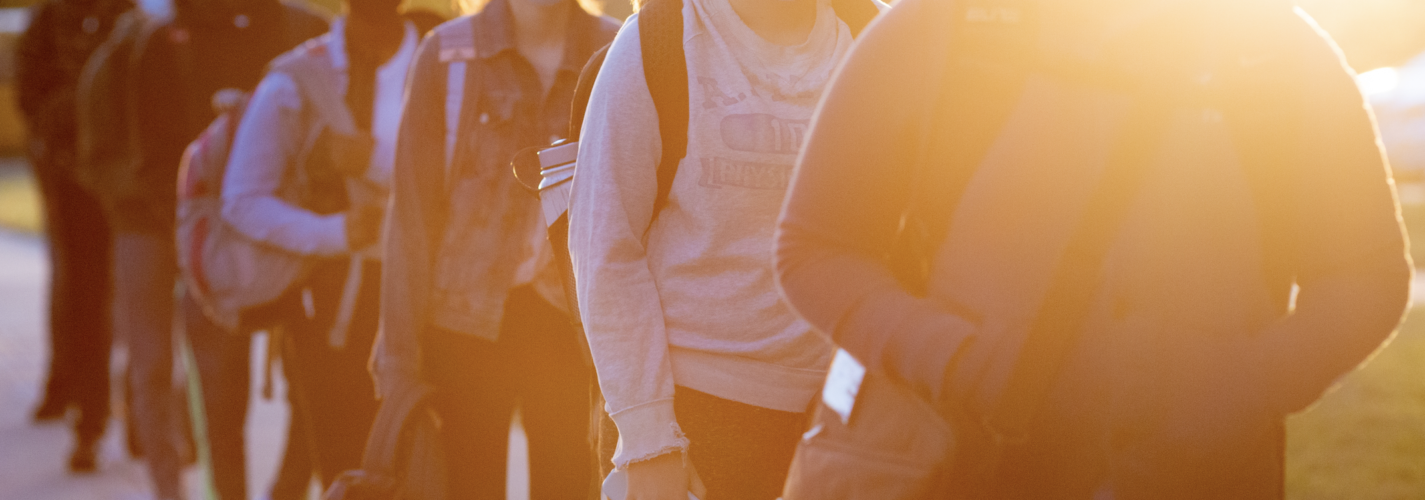A Back-to-School Q&A: What MN Students Are Saying
By Adrienne Vitt
After more than a year of restrictions and online schooling, most students are back in school buildings across the state. This month, we connected with a group of young people—A’mari, Cariyah, Juwaria, Lincoln, Makenzi, Walter, and Zee—to hear their thoughts on how it’s going: what’s weighing on their minds, what’s working, and what’s getting in the way of their success as they return to the classroom.
The most notable theme is that students are overwhelmed. The pandemic is a significant component of that stress, and while that may be intuitive, what we heard from students is that it is not always visible—and that, at least for now, it is still having a notable impact on their ability to fully engage.
Hitting a new stride may take time—and students want to be seen, heard, and participate in this moment of educational shift. Their reflections on a few key themes follow.
Q: What is working for you right now?
“Flexibility within my classes and schedule has really been helping me feel less stressed and allowed me more time to study— flexible schedules or focused breaks should be put in place to ease students’ stress and workload. ” – Juwaria, 12th Grade
“Something that is working for me that other students should experience is having a teacher or a staff member at school that you’re close with to help and talk to.” – Zee, 9th Grade
“Right now, I’m taking a class where you get to talk about racism, understand it better, and history. I got to help plan a walkout and face challenges. I even got interviewed for an article.” – A’mari, 8th Grade
“Flexibility and options allow students to be in the driver’s seat and navigate their own world of education.” – Walter, 12th Grade
“Be very clear with students about what the point of their time in school is. Without a strong sense of purpose and an adaptable support system to help them achieve their purpose, school can be disempowering, disheartening, or an all-around negative experience. Make students aware of their inherent value and help them separate their self-worth from traditional performance markers.” – Lincoln, College Freshman
Q: What do you want adult decision-makers to know, and what’s weighing on your mind as you return to school?
“I want the adult decision-makers in the school system to understand that the children they teach don’t come from the same background that they do. We do not always have the means or resources to be successful like they do/did.” – Cariyah, 12th Grade
“Adults are missing the understanding that some students have trouble with anxiety and mental illness/health. They are not always able to be in the right mindset or be present enough. Try not to be so controlling just because you have the power.” – A’mari, 8th Grade
“I want them to know that I like to be called Zee, not my government name. I haven’t been to school in person in a long time, and I’m not really a people person. I have a short attention span, but I’m not missing or ignoring anything. I process information differently.” – Zee, 9th Grade
“Inadequacy is weighing heavily on my mind—by that, I mean failing to meet all the expectations I have for myself in senior year. I’m in between homes right now, don’t have transportation to and from school, and don’t have a job that’s set in stone which is frustrating.” – Cariyah, 12th Grade
Q: What change would you like to see in your education?
“School boards should be primarily made up of students. This may sound radical, but just having a few is performative and doesn’t give students any real power or authority. We are the primary stakeholders in education—we generate revenue for schools. We deserve more than a voice in our education—we deserve the ability to shape our experience and ensure our tax dollars are being used effectively.” – Lincoln, College Freshman
“Adult decision-makers are ignoring the fact that some school dress codes are unnecessary. A shoulder or even a girl’s legs aren’t distracting to anyone other than faculty enforcing the dress code.” – Makenzi, 9th Grade
“They need young people at the table at all times. Youth should have equal power to decide what happens in a school, or at least some.” – Walter, 12th Grade
The Bottom Line
Returning to “normal” isn’t what these students are looking for. Instead, flexible and inclusive learning, supporting their mental health, and opportunities to play a role in the decisions that shape their education and communities are front of mind. So as we stretch ourselves to new limits, even in the most challenging of times, welcome students to the table. They’re eager to help.
Student comments have been edited for length, but otherwise, appear as originally submitted.

